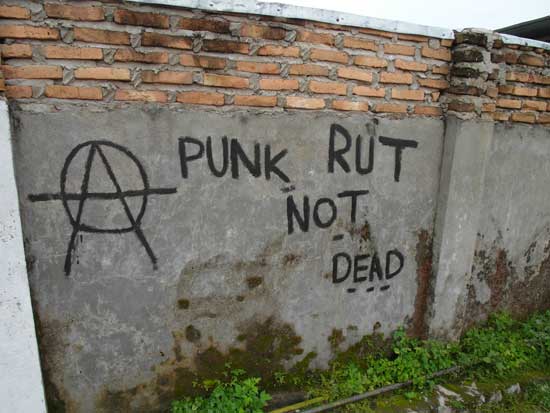
In theory, every child in Indonesia gets at least three years of English teaching in primary school, and several years more in middle and secondary school. So it’s initially surprising that the majority of Indonesian kids can manage nothing more than “Hello Mister!”, and the occasional “wossyonem?” Perhaps more surprising still that so many seem to aspire to English language graffiti.
Last week, I had an insight into why they don’t absorb more English. I was having breakfast with a primary school teacher in the Banggai islands in central Sulawesi. What time does school start? I asked. “Seven”. It was ten past. I raised an eyebrow. “It’s OK, I’ve told the school head I’ve got a guest”.
This did not seem OK to me, so I volunteered to come along to school and help with the English class. We got to school at 7.30; the grounds were awash with kids in their tidy uniforms, running around screaming as primary school kids are wont to do. Not one of the other eight teachers had shown up. My friend took her class (year one). I took years 4 and 6, since they were scheduled for English that day. Classes 2, 3 and 5 were told to go and sit quietly and study by themselves. After a couple of hours, the head teacher showed up. “I’m not supposed to teach, but sometimes I have to fill in,” she grumbled. No sign of any other teachers.
With teachers playing hookey like this, is it any wonder that even Indonesia’s vandalism is illiterate?
P.S. On the subject of Punk Rut, I was interested in this headline from the Jakarta Globe:
I suspect these punks of lacking conviction…

On the supply side, yes there is a shortage and misallocation of qualified and experienced teachers. On the demand side, though, would you in general terms describe Indonesian society as one that cherishes learning, education and the intellect? How many people do you see reading in public? In a society with a strong tall-poppy syndrome, what happens socially to the smart kid? What’s more important, religion/adat or the intellect/knowledge?
I had the opportunity to work and live in Aceh (not, not Tsunami-recon related). Befitting a strongly conservative society, no one seemed at all bothered or concerned about how the punks had been treated and handled. This is, after all, a society where instances of khalwat and conversions to Islam are considered noteworthy items that routinely appear on the front pages of the newspapers. Given the province’s problems and challenges, I rather think religious fervor would be better directed at combating corruption, political infighting, violence and polarization. But no, apparently people like to fry the tiny fish.